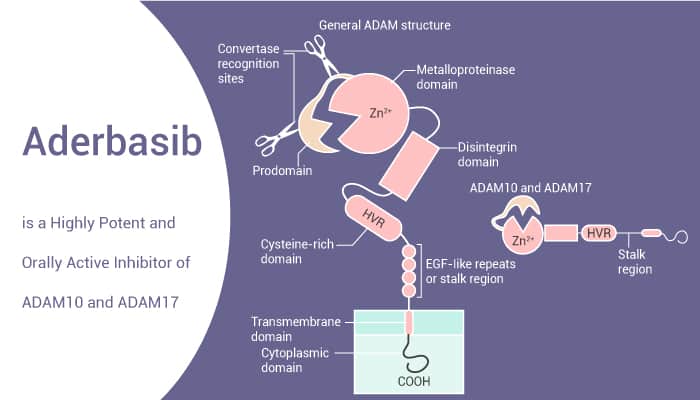ADAMs (a disintegrin and metalloproteinases), originally also known as MDC proteins (metalloproteinase/disintegrin/cysteine-rich). And ADAMs belong to the Metzincins superfamily of metalloproteases. Recently, studies have found ADAM genes exist in animals, choanoflagellates, fungi and some groups of green algae. Importantly, ADAMs mediates proteolytic ectodomain release. And the ectodomain shedding is associated with many diseases, such as autoimmune and cardiovascular diseases, neurodegeneration, infection, inflammation and cancer. Therefore, ADAMs become attractive targets for novel therapies. In various human cancers, there is an increased expression of ADAM-8, -9, -10, -15, -17, -19, and -28.
Studies have shown that ADAM10 and ADAM17 are essential for many developmental and physiological processes. And they are necessary for the development of tissues and organisms. In addition, both ADAM10 and ADAM17 modulate tumor progression through their influence on distinct cellular pathways. According to reports, overexpression of ADAM10 was shown in colon cancer, gastric cancer and so on. In prostate cancer cell lines, androgens and growth factors could upregulate the mRNA expression level of ADAM10. Meanwhile, overexpressed ADAM17 also exists in different tumor tissues, such as breast, brain, colon, kidney and so on. In breast cancer, ADAM17 expression correlated with the invasive state of the tumor. And anti-ADAM17 antibodies can inhibit the proliferation of breast cancer cell lines. What’s more, high ADAM17 expression correlated with a shorter survival rate of the patients.
Aderbasib (INCB007839) is a potent and orally active inhibitor of ADAM10 and ADAM17.

Aderbasib is a potent ADAM10 and ADAM17 inhibitor. Specifically, Aderbasib inhibits the metalloprotease activity through binding to the active site of the metalloproteinase domain. Moreover, Aderbasib shows antiviral effect against CSFV pseudovirus in PK15 cells. According to this, Aderbasib exhibits robust antineoplastic activity, including diffuse large B-cell non-Hodgkin lymphoma, HER2+ breast cancer, gliomas, et al. Aderbasib blocks glioma growth of SU-pcGBM2 NSG mice xenografts.
Taken together, Aderbasib is an orally active and target specific inhibitor of ADAM10 and ADAM17. Furthermore, Aderbasib exhibits robust antineoplastic activity in vivo.
References:
[1] Saftig P, et, al. Eur J Cell Biol. Jun-Jul 2011;90(6-7):527-35.
[2] Giebeler N, et, al. Toxins (Basel). 2016 Apr 23;8(4):122.